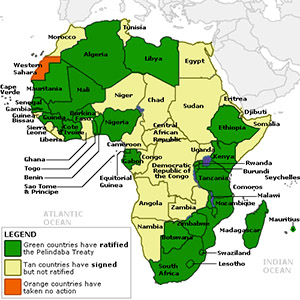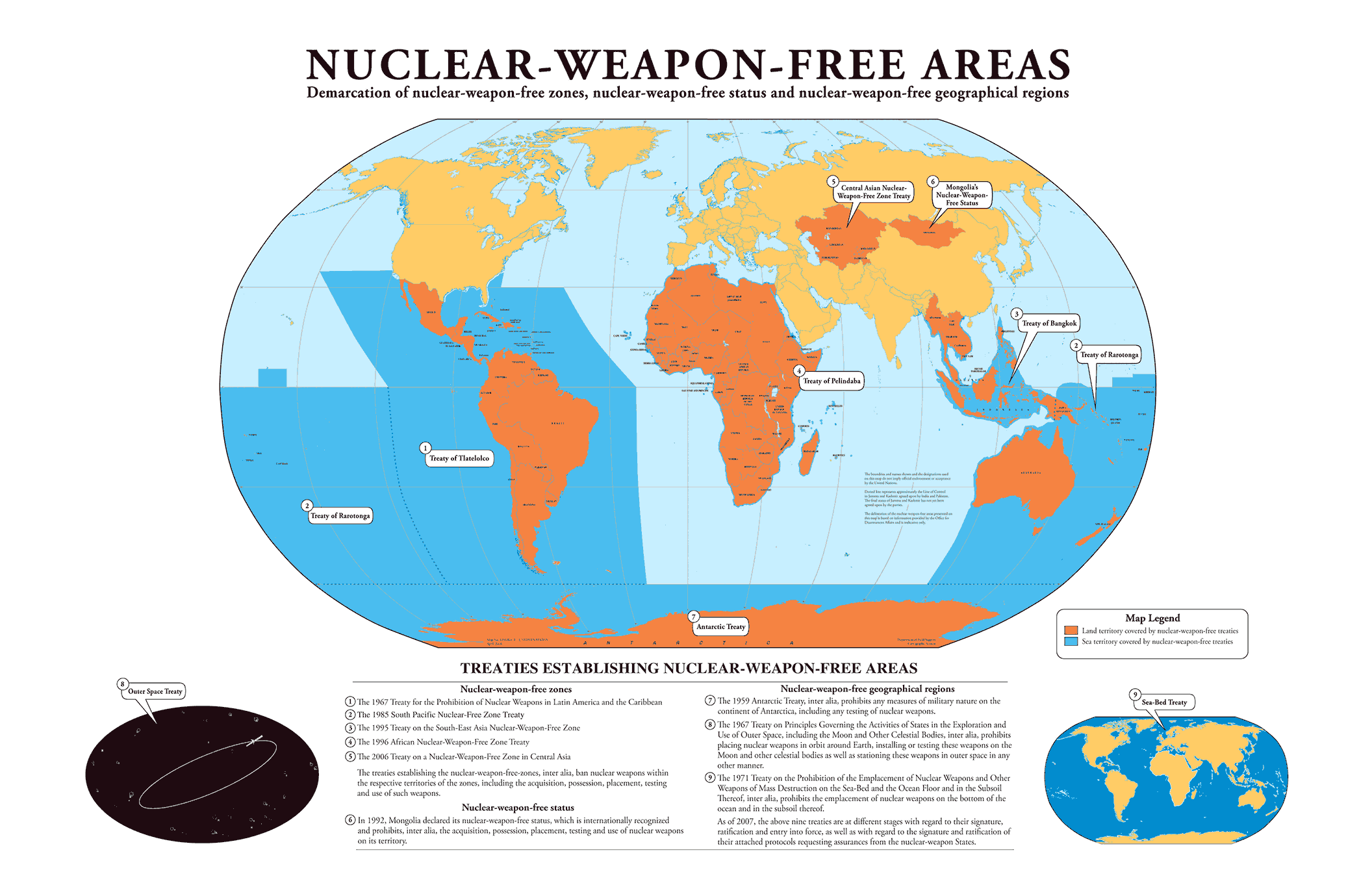Liviu Horovitz
August 12, 2009
Thirteen years after its official opening for signature, the African Nuclear-Weapon-Free Zone (Treaty of Pelindaba) has entered into force. On July 15, 2009, Burundi deposited its instrument of ratification, the 28th and final instrument required for the Treaty’s entry into force. [1]
In the aftermath of French testing in Algeria, the United Nations General Assembly adopted in 1961 a resolution calling for a zone free of nuclear weapons in Africa. [2] Three decades later, after South Africa’s accession to the Nuclear Non-Proliferation Treaty (NPT), the Organization of African Unity established a Joint Group of Experts to draft the treaty text. Following the completion of the text in Johannesburg and Pelindaba in June 1995, the Treaty opened for signature in Cairo on April 11, 1996.
The Pelindaba Treaty covers the entire African continent, as well as the surrounding islands, and establishes a legally binding obligation to not only refrain from developing, producing, or otherwise acquiring nuclear weapons, but also to not test, allow, assist, or encourage testing, dump radioactive waste, or station nuclear weapons on the territory of any of the member states of the treaty. In addition, the Treaty commits its parties to apply the highest standard of security and physical protection of nuclear material, facilities, and equipment to prevent theft and unauthorized use, as well as prohibits armed attacks against nuclear installations within the zone. [3] Over the last 13 years, all 52 African nations have signed the Pelindaba Treaty, while 28 African nations ratified. [4] With similar treaties already in force in South America (Treaty of Tlatelolco), the South Pacific (Treaty of Rarotonga), Southeast Asia (Treaty of Bangkok), and Antarctica (Antarctic Treaty), [5] the entire Southern hemisphere is now a zone free of nuclear weapons – an immense success and a great opportunity for further positive steps for Africa in particular, and the international community at large.
CNS & Pelindaba
In 2007, with the generous support of the Norwegian Ministry of Foreign Affairs, CNS, in cooperation with the Institute for Security Studies (ISS) in Pretoria, South Africa, launched a project to promote actively the entry-into-force of the Pelindaba Treaty and elaborate strategies to ensure its effective implementation. Over the years, CNS experts have provided advice and support for the Treaty’s ratification for African government officials and NGO experts in Monterey, New York, Geneva, Vienna, and at numerous meetings on the African continent. Through the initiative of CNS, two workshops were held in Pretoria in conjunction with the ISS in 2007 and 2008. [6] The May 2008 workshop examined what can be done to encourage and assist states in southern Africa to ratify the Treaty, how the Treaty’s entry into force would strengthen Africa’s role in the nuclear nonproliferation and disarmament regime, and what benefits were to be expected from regional institutions that would be established after the Treaty’s entry-into-force. [7]
Jean du Preez, then-Director of the CNS Nuclear Nonproliferation Project, co-authored a Ratification Guide published by ISS in Pretoria. The Guide was made available by CNS to African missions at the United Nations in New York. [8] The International Organizations and Nonproliferation Program at CNS created a Pelindaba resource webpage, [9] and CNS staff played important roles in framing the academic discussion around the Treaty. [10] Following a meeting on the margins of the 2008 NPT Preparatory Committee in Geneva, facilitated by Mr. Du Preez and hosted by the South African Ambassador to the IAEA in Vienna, the Friends of the Pelindaba Working Group was established. In addition to CNS and ISS, the World Council of Churches, the International Campaign to Abolish Nuclear Weapons (ICAN), and Parliamentarians for Nuclear Nonproliferation and Disarmament (PNND) also participate in the group.

Ratifying African countries.
Future Challenges & Opportunities
The Pelindaba Treaty’s entry into force requires that a Conference of all Parties be convened as soon as possible by the African Union to establish the way forward. Steps including the establishment of the African Commission on Nuclear Energy (AFCONE), the ratification of the Treaty’s protocols, and the wider ratification process in the remaining 24 countries represent both challenges and opportunities for Africa’s policy makers.
The Pelindaba Treaty is unique in that it requires the establishment of a regional organization – the AFCONE – that will be tasked not only to oversee the full implementation of the Treaty, but also to promote the peaceful application of nuclear technology and science among the member states. African governments now face the considerable challenge of establishing the guidelines for this organization. Potentially, AFCONE could act as a catalyst for cooperation among African nations in the various applications of nuclear energy and technology, environmental protection, and international nuclear trade, therefore becoming a clearing-house for African nuclear expertise and a regional partner for the IAEA. [11] CNS and ISS are planning a series of events during 2009 and 2010 designed specifically to promote awareness of the importance of AFCONE, while at the same time promoting practical ways forward for the implementation of the Treaty.
Similar to other Nuclear-Weapon-Free Zones, the Pelindaba Treaty contains protocols open for ratification by specific states outside the zone. China, France, and the United Kingdom ratified the first protocol calling on NPT nuclear-weapon states not to use or threaten to use nuclear weapons against Treaty members, as well as the second protocol calling on nuclear-weapon states not to test, assist, or encourage testing of nuclear weapons within the zone. Concerned about Libya’s WMD program, the U.S. government refused to tie its hands further after signing the two protocols in 1996 and to date has refrained from ratifying either. [12] Russia has also not ratified the first two protocols because of the status of Diego Garcia, an island in the Indian Ocean under the control of the United Kingdom, which serves as a military base for the United States. [13] The third protocol calls on France and Spain to apply the provisions of the treaty in territories within the zone for which they have de jure or de facto international responsibility; France has ratified the protocol, while Spain refuses to commit for reasons independent of its nuclear obligations. [14]
Due to both political opposition and lack of governance, some of the remaining 24 ratifications are likely to be difficult to acquire in the short term. For example, Cairo’s primary concerns are Israel’s nuclear status and Iran’s nuclear intentions. Egypt has gradually conditioned its willingness to take any additional arms control steps on Israel’s NPT accession. [15] Consequently, Egypt is not a party to either the chemical or the biological weapons conventions, does not adhere to the IAEA’s Additional Protocol, and has not ratified the Pelindaba Treaty. [16]
Finally, the Pelindaba Treaty remains unique by linking regional and international organizations to ensure complete regional nuclear disarmament; the treaty requires the dismantlement and destruction of any nuclear explosive device or nuclear weapons production facility under IAEA and AFCONE verification prior to the Treaty’s entry into force. South Africa’s renunciation and complete dismantlement of its nuclear arsenal at the beginning of the 1990s and Libya’s 2006 renouncement of all weapons of mass destruction were vital steps in this process of entry into force. The Pelindaba Treaty thus serves as an important example of the promise of NWFZs as an approach for promoting both nonproliferation and disarmament.
The author would like to thank Dr. William Potter, Dr. Patricia Lewis, Mr. Miles Pomper, Mr. Kenley Butler, and Mr. Kaegan McGrath for their extremely helpful comments and review.
Sources:
[1] Amelia Broodryk and Noel Stott, “Africa is now officially a zone free of nuclear weapons,” Arms Management, Institute for Security Studies, Pretoria.
[2] UN General Assembly Resolution 1652.
[3] African Nuclear-Weapon-Free Zone Treaty (Pelindaba Treaty).
[4] The 28 states that have ratified are Algeria, Benin, Botswana, Burkina Faso, Burundi, Cote d’Ivoire, Equatorial Guinea, Ethiopia, Gabon, Gambia, Guinea, Kenya, Lesotho, Libyan Arab Jamahiriya, Madagascar, Malawi, Mali, Mauritania, Mauritius, Mozambique, Nigeria, Rwanda, Senegal, South Africa, Swaziland, Togo, United Republic of Tanzania, and Zimbabwe. See “Pelindaba Treaty Profile,” Inventory of International Nonproliferation Organizations and Regimes, James Martin Center for Nonproliferation Studies, Monterey.
[5] For a more detailed review and analysis of nuclear weapons free zones see Jozef Goldblat, “Nuclear-Weapons-Free Zones: A History and Assessment, Nonproliferation Review, Vol. 4, Nr. 3, Summer 1997.
[6] “Towards 2010: The Role of the African Nuclear Weapons Free Zone Treaty in Strengthening the Disarmament Objectives of the non-Proliferation Treaty (NPT): a Southern African Regional Seminar: Summary by the Co-Chairs,” Pretoria, South Africa, March-April , 2008.
[7] Jean du Preez, “The Race Towards Entry Into Force of the Pelindaba Treaty: Mozambique Leading the Charge,” CNS Feature Story, March 31, 2008.
[8] Noel Scott, Amelia du Rand, and Jean du Preez, “A Brief Guide to the Pelindaba Treaty: Towards Entry-into-Force of the African Nuclear-Weapon-Free Zone Treaty,” Arms Management Program, Institute for Security Studies, October 2008, www.issafrica.org.
[9] “African Nuclear Weapon-Free Zone Treaty (Pelindaba Treaty) Resources,” James Martin Center for Nonproliferation Studies, International Organizations and Nonproliferation Program (IONP).
[10] Jean du Preez, “The Race Towards Entry into Force of the Pelindaba Treaty: Mozambique Leading the Charge,” CNS Feature Story, March 31, 2008.
[11] See Jean du Preez, “The Potential Role and Functions of the African Commission on Nuclear Energy: Assessing the Benefits for Africa,” James Martin Center for Nonproliferation Studies website. See also Noel Scott, “Entry-into-Force of the Treaty of Pelindaba: Establishing the African Commission on Nuclear Energy (AFCONE),” Presentation at the Nuclear Proliferation and Nuclear Energy Forum, Aman, Jordan, June 22, 2009, and Sola Ogunbanwo, “Accelerate the Ratification of the Pelindaba Treaty,” Nonproliferation Review, Vol. 10, Nr. 1, Spring 2003.
[12] The White House noted that the Treaty “will not limit options available to the United States in response to an attack by a [Pelindaba Treaty] party using weapons of mass destruction,” See White House, Press Briefing by Robert Bell, Special Assistant to the President and Senior Director for Defense Policy and Arms Control, National Security Council, April 11, 1996.
[13] Letter from the Russian Ambassador to the Secretary-General of the Organization of African Unity, Addis Ababa, November 5, 1996.
[14] The Spanish Association of International Law and International Relations Professors, Spanish Yearbook of International Law (Martinus Nijhoff Publishers, 1995), pp. 184-185.
[15] For a review of Egypt’s diplomatic efforts see Robert J. Einhorn, “Egypt: Frustrated but Still on a Non-Nuclear Course,” in Kurt M. Campbell et al, eds., The Nuclear Tipping Point (Washington: Brookings, 2004), pp. 43-82.
[16] Inventory of International Nonproliferation Organizations and Regimes, “Egypt,” James Martin Center for Nonproliferation Studies website.

